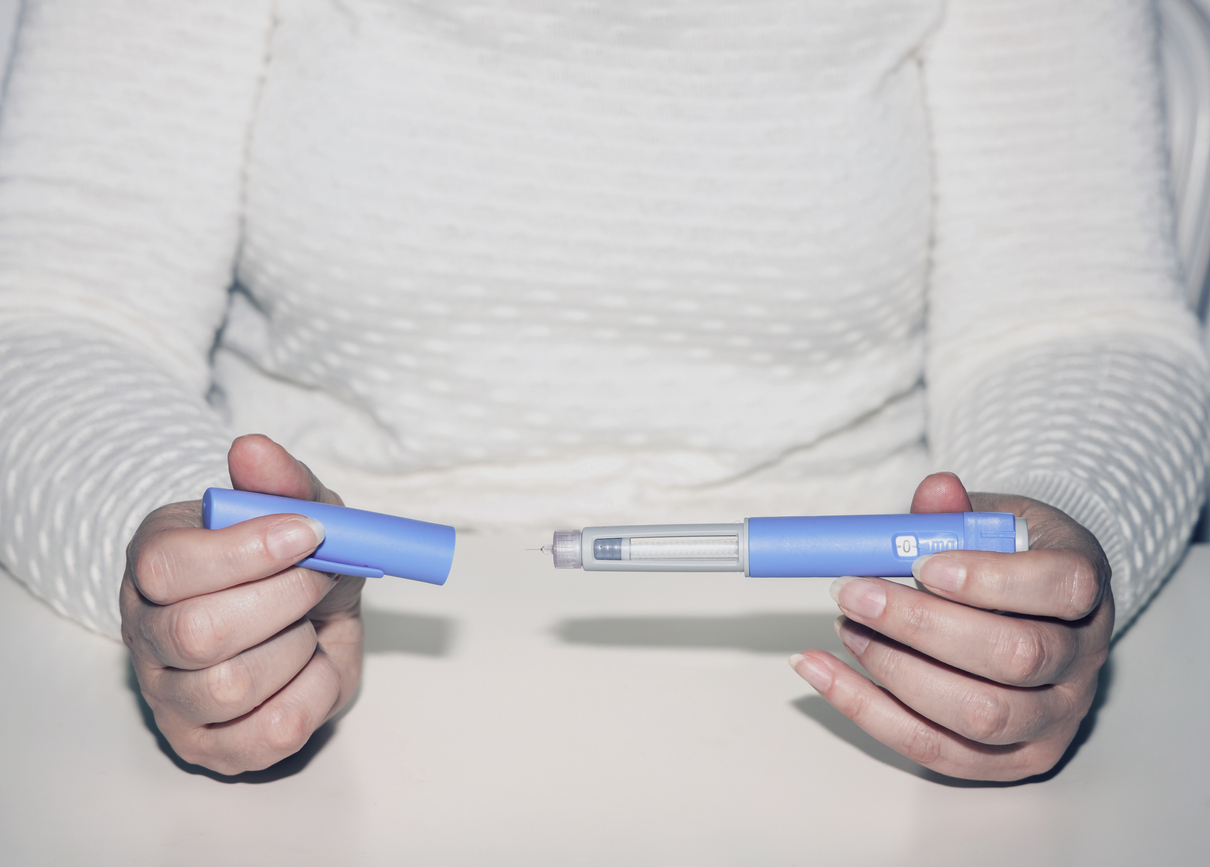Beyond the Scale: Can Weight Loss Drugs Be the Next Frontier in Addiction Treatment?
By Caleigh Findley
 Researchers are “unsurprised” by reports of decreased addictive behaviors from patients on blockbuster weight loss drugs like Ozempic.
Researchers are “unsurprised” by reports of decreased addictive behaviors from patients on blockbuster weight loss drugs like Ozempic.
It’s been over 10 years since the last treatment for alcohol use disorder received approval from the FDA.
That’s being generous – the decision greenlighted an injectable version of a drug that had already received approval, Vivitrol. Campral was the last novel medication to market, gaining approval in 2004. That means nearly two decades have passed without new, innovative therapies in addiction treatment.
The next contender making its way through clinical trials comes from a most unexpected place: diabetes and weight loss drugs like Ozempic. Though that’s no surprise if you’re an addictions researcher like Dr. Mehdi Farokhnia, staff scientist at the National Institute on Drug Abuse and the National Institute on Alcohol Abuse and Alcoholism.
“While we are happy to see these reports, GLP-1 has been studied in the addiction field for almost a decade, mostly in animal models,” said Farokhnia.
Ozempic and similar medications (GLP-1 agonists) mimic the action of glucagon-like peptide-1 (GLP-1), a hunger hormone. GLP-1s work by stimulating this hormone, which increases insulin production and lowers blood sugar levels after eating. This mechanism also helps curb appetite by promoting feelings of fullness.
The biological networks that control hunger also cross paths with networks related to alcohol use disorder and other addictions. Many studies have reported that using GLP-1 drugs in animal models decreases alcohol intake, including with Ozempic treatment.
Older GLP-1 medications made it to clinical trials for addiction but failed to show effectiveness. However, those medications were not as long-lasting and potent as today’s GLP-1s, added Farokhnia.
Then came the latest wave of GLP-1 therapies like Ozempic. This new generation packs a heavier punch – one that has researchers optimistic about their promise for addiction treatment, said Joseph Schacht, associate professor at the University of Colorado Anschutz Medical Campus.
Based on the increased performance of GLP-1s and anecdotal reports of reduced drinking on them, Schacht said it’s “generated new enthusiasm for human clinical trials of these medications for alcohol use disorder.”
When ‘feel good’ and ‘feel full’ hormones meet
Hunger and addiction go hand-in-hand when it comes to the inner workings of your brain. The two pathways have shared touchpoints, like the hormone GLP-1, which can influence both feelings of being full and being rewarded.
That’s because GLP-1 can interact with the reward pathway in the brain, which is primarily controlled by a hormone called dopamine. Popularized as the “feel good” hormone, dopamine is involved in pleasure and reward sensations – and plays a role in addiction behavior.
Some animal studies show that GLP-1 can blunt the dopamine response to a reward, explained Schacht. This effect could weaken the driving forces of addiction, but it remains unclear if this would also happen in humans.
“The effect [in rodents] is very robust, but that may or may not translate to humans. We know humans are very, very different,” said Farokhnia.
The road ahead
It is still early days for research into novel uses for GLP-1 drugs, but the excitement from scientists doing research and the promise these drugs may have in addiction treatment is notable.
Several phase 2 clinical trials are ongoing to test diabetes and weight loss drugs for addiction disorders. That said, if GLP-1s were to gain future approval for addiction, getting these medications into the hands of patients may not prove easy.
“Less than 1% of people who need medications for addiction actually receive medication,” said Farokhnia. He added that psychological barriers can often prevent patients from recognizing their addiction and seeking treatment.
Though the now available once-weekly GLP-1 drugs like Ozempic decrease patient burden in maintaining a treatment regimen, the psychological aspects that prevent patients from reaching out in the first place remain.
It’s also unclear whether these medications would be a short- or long-term treatment, Schacht added.
“Patients who are taking GLP-1s for diabetes or weight loss require chronic treatment,” Schacht said. “So any effect on alcohol consumption or cravings might require a similar length of treatment.”
This point, however, does not discount the potential for short-term intervention, he said, as some addiction treatments are only used to regulate cravings and prevent relapse during recovery.
Looking forward, the journey of GLP-1 drugs in addiction treatment holds both promise and challenges. Researchers and clinicians eagerly await data from clinical trials that may eventually redefine the landscape of recovery.
Learn more about GLP-1s and other diabetes treatments here:








